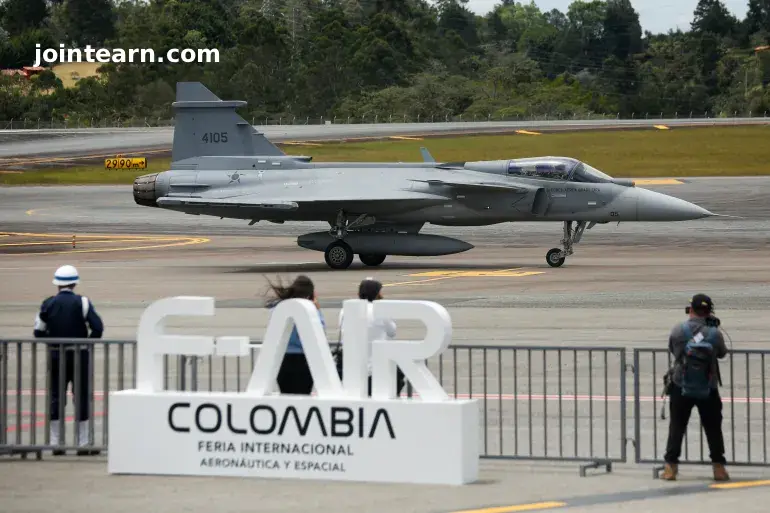
Colombian President Gustavo Petro has confirmed a landmark $4.3bn defence agreement to acquire 17 advanced fighter jets from Swedish manufacturer Saab, marking one of the country’s most significant military purchases in decades. The announcement comes at a time of mounting geopolitical tension across Latin America and increasingly strained relations between Colombia and the United States.
Petro Confirms Purchase of 17 Swedish Gripen Jets
Speaking on Friday, President Petro revealed that Bogotá had finalised its agreement with Saab to buy 17 JAS 39 Gripen multirole fighter aircraft, offering the first official confirmation of both the scale and cost of the acquisition. The deal was initially hinted at in April, but details remained undisclosed until now.
Calling the fighter jets a “deterrent weapon to achieve peace,” Petro emphasised that the purchase was designed to strengthen Colombia’s defensive capabilities in a region grappling with political friction, military build-ups, and international disputes.
The Gripen, known for its cutting-edge avionics and versatility, will place Colombia among a select list of countries—such as Sweden, Brazil, and Thailand—that operate the aircraft.
Rising Regional Tensions and US Military Activity
Colombia’s decision to bolster its air force comes amid heightened unease in Latin America over expanding US military operations in the Caribbean and eastern Pacific.
Washington claims to have conducted 20 strikes on alleged drug-smuggling vessels in international waters, resulting in an estimated 80 deaths. However, the US has provided no evidence to support its assertions, sparking outrage among Latin American governments, human rights groups, and international legal experts.
Critics accuse the US of carrying out extrajudicial killings, arguing that individuals suspected of drug trafficking should be arrested and tried—not killed at sea.
War of Words Between Petro and Trump Escalates
Relations have further deteriorated due to a sharp rhetorical clash between President Petro and US President Donald Trump. Trump has repeatedly accused Petro and Venezuelan President Nicolás Maduro of involvement in regional drug trafficking—claims both leaders strongly deny.
In response, Petro has accused Trump of using military operations as a pretext to control Venezuela’s oil reserves and destabilise Latin America. He warned that Colombia must be prepared to deter “aggression from anywhere” in what he described as a “geopolitically messy world.”
The heated exchanges intensified after Trump removed Colombia from the US list of nations considered allies in the fight against global drug trafficking and withdrew significant financial aid.
Confusion Over Colombia–US Intelligence Cooperation
Amid the escalating diplomatic dispute, Petro announced last week that Colombia would suspend intelligence sharing with the United States. However, government officials later rolled back the statement, clarifying that cooperation in combating drug trafficking would continue.
The mixed signals reflect broader uncertainties in Colombia–US relations, historically one of the strongest security partnerships in the Western Hemisphere.
Why Colombia Chose Sweden’s Gripen Over US and French Offers
According to AFP, American and French aerospace companies had also sought to sell fighter jets to Colombia. Ultimately, Saab’s Gripen was selected based on performance, cost, and strategic considerations.
Swedish Defence Minister Pål Jonson welcomed the deal, saying it would “significantly deepen” defence cooperation between Sweden and Colombia. The agreement is expected to strengthen bilateral ties in military training, technological exchange, and long-term defence planning.
A Strategic Purchase in an Uncertain Future
For Petro’s government, the acquisition of the Gripen jets is not merely a military upgrade—it is a geopolitical signal. As tensions rise between Bogotá and Washington, and as Latin America braces for the effects of US military expansion, Colombia is seeking to reinforce its air defence capabilities and assert greater autonomy in regional affairs.
Whether the deal will contribute to the “peace through deterrence” Petro envisions remains to be seen—but it undeniably marks a turning point in Colombia’s defence strategy and its positioning on the global stage.


Leave a Reply